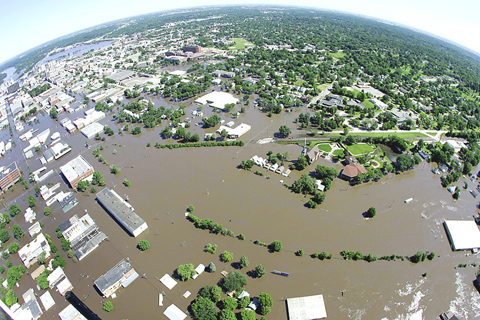More rain was heading for flood-ravaged Iowa yesterday, where tens of thousands of residents have been forced to flee their homes and officials struggled to reinforce breached levies and stem the rushing waters.
Cedar Rapids got some relief on Saturday as the flood receded more quickly than expected. The city has been hit the hardest, with 1,300 streets submerged and 24,000 of the city’s 124,000 residents forced out of their homes.
But the rushing water was heading straight for Iowa City, where 35 blocks were already inundated and crews loaded sandbags into boats and army trucks to reinforce barricades in danger of breaching.

PHOTO: AP
The college town’s sloping hills will save it from total devastation, but at least 10 percent of its buildings will be inundated by the time the river crests around midnight today, Johnson County spokesman Mike Sullivan said.
And it will take at least a week for the river to return to normal levels.
“This is a flood of epic proportions,” Sullivan said. “It’s absolutely devastating.”
A large swath of Des Moines was underwater after a river levee was breached in the city of 200,000 of Saturday morning and officials were concerned that a forecasted evening thundershower could raise river levels even higher.
Muddy water from the Des Moines River covered several bridges and poured down streets north of the state Capitol, swallowing a neighborhood with about 200 homes and 40 businesses.
At least 2,500 volunteers had registered to help hold the water back by filling and laying down even more sandbags under the hot sun.
“This has been a very trying week for our state,” Iowa Governor Chet Culver said in a statement.
Serious flooding has hit the entire region, including parts of South Dakota, Minnesota, Wisconsin, Nebraska, Illinois, Indiana, Kansas, Oklahoma and Arkansas.
The death toll from the extreme weather stands at 16 in Iowa and five more elsewhere in the Midwest.

In his National Day Rally speech on Sunday, Singaporean Prime Minister Lawrence Wong (黃循財) quoted the Taiwanese song One Small Umbrella (一支小雨傘) to describe his nation’s situation. Wong’s use of such a song shows Singapore’s familiarity with Taiwan’s culture and is a perfect reflection of exchanges between the two nations, Representative to Singapore Tung Chen-yuan (童振源) said yesterday in a post on Facebook. Wong quoted the song, saying: “As the rain gets heavier, I will take care of you, and you,” in Mandarin, using it as a metaphor for Singaporeans coming together to face challenges. Other Singaporean politicians have also used Taiwanese songs

NORTHERN STRIKE: Taiwanese military personnel have been training ‘in strategic and tactical battle operations’ in Michigan, a former US diplomat said More than 500 Taiwanese troops participated in this year’s Northern Strike military exercise held at Lake Michigan by the US, a Pentagon-run news outlet reported yesterday. The Michigan National Guard-sponsored drill involved 7,500 military personnel from 36 nations and territories around the world, the Stars and Stripes said. This year’s edition of Northern Strike, which concluded on Sunday, simulated a war in the Indo-Pacific region in a departure from its traditional European focus, it said. The change indicated a greater shift in the US armed forces’ attention to a potential conflict in Asia, it added. Citing a briefing by a Michigan National Guard senior

CHIPMAKING INVESTMENT: J.W. Kuo told legislators that Department of Investment Review approval would be needed were Washington to seek a TSMC board seat Minister of Economic Affairs J.W. Kuo (郭智輝) yesterday said he received information about a possible US government investment in Taiwan Semiconductor Manufacturing Co (TSMC, 台積電) and an assessment of the possible effect on the firm requires further discussion. If the US were to invest in TSMC, the plan would need to be reviewed by the Department of Investment Review, Kuo told reporters ahead of a hearing of the legislature’s Economics Committee. Kuo’s remarks came after US Secretary of Commerce Howard Lutnick on Tuesday said that the US government is looking into the federal government taking equity stakes in computer chip manufacturers that

US President Donald Trump on Friday said that Chinese President Xi Jinping (習近平) told him China would not invade Taiwan while Trump is in office. Trump made the remarks in an interview with Fox News, ahead of talks with Russian President Vladimir Putin over Moscow’s invasion of Ukraine. “I will tell you, you know, you have a very similar thing with President Xi of China and Taiwan, but I don’t believe there’s any way it’s going to happen as long as I’m here. We’ll see,” Trump said during an interview on Fox News’ Special Report. “He told me: ‘I will never do